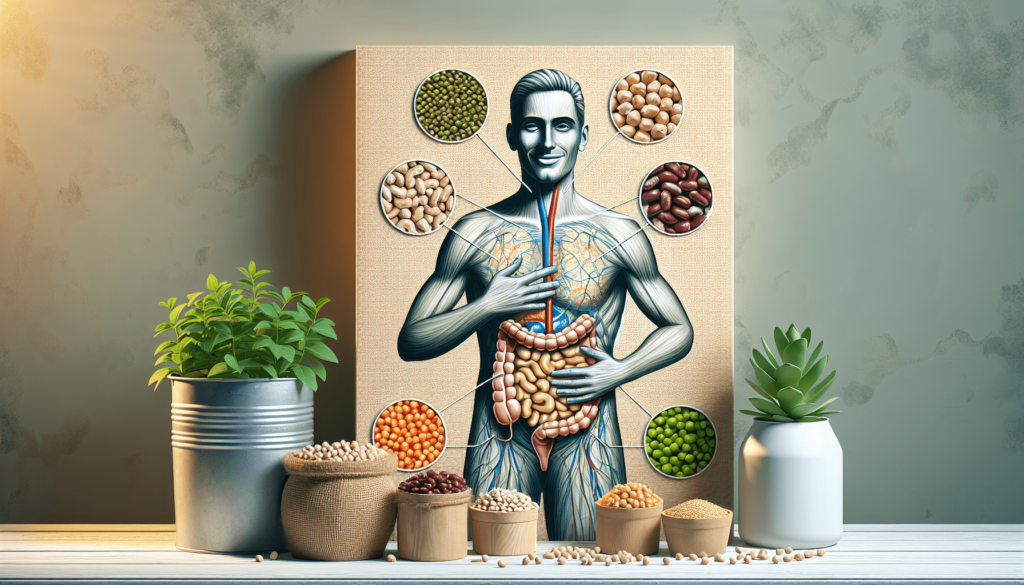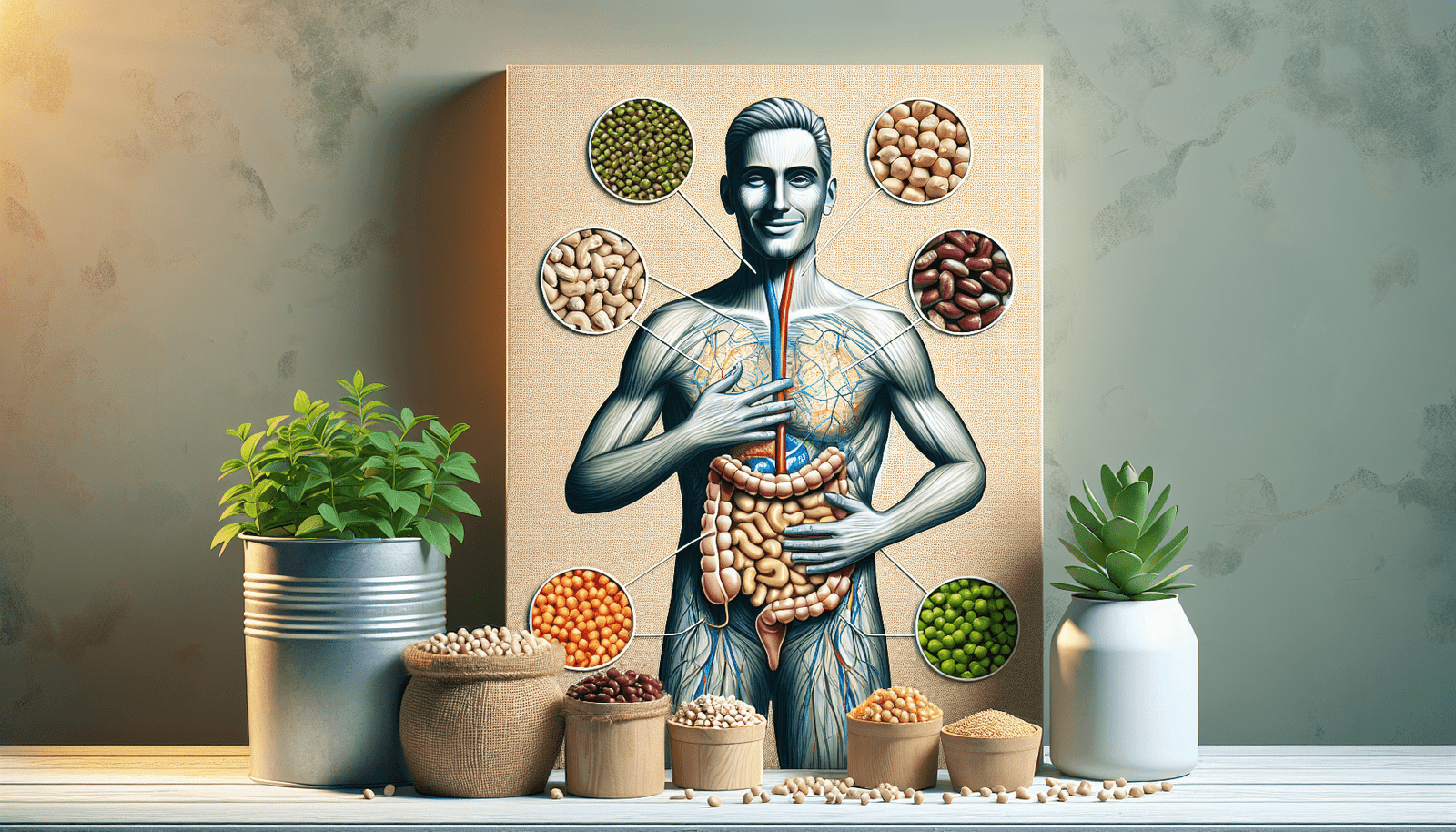If you’ve ever wondered how to keep your digestive system in tip-top shape, look no further than the humble legume. These little powerhouses of nutrition are not only delicious and versatile, but they also play a vital role in promoting regular bowel movements. Packed with fiber, legumes help to keep things moving smoothly through your intestines, preventing constipation and promoting a healthy digestive system. So, the next time you’re at the grocery store, don’t forget to stock up on beans, lentils, and chickpeas. Your gut will thank you!
Introduction
If you’re looking to improve your digestive health and promote regular bowel movements, legumes could be your new best friend! Legumes, which include beans, lentils, chickpeas, and more, are not only delicious but also packed with fiber and other nutrients that can have a positive impact on your gut health. In this article, we will explore the various ways in which legumes contribute to promoting regular bowel movements and overall digestive wellness.
Fiber Content in Legumes
Insoluble Fiber
One of the key reasons legumes are great for promoting regular bowel movements is their high insoluble fiber content. Insoluble fiber adds bulk to the stool, helping to prevent and alleviate constipation. This type of fiber is not broken down by the body and passes through the digestive system relatively intact, aiding in the movement of food through the intestines.
Soluble Fiber
In addition to insoluble fiber, legumes also contain soluble fiber. Soluble fiber absorbs water and forms a gel-like substance in the intestines, which can soften the stool and promote regular bowel movements. It also acts as a prebiotic, providing fuel for the beneficial bacteria in the gut and contributing to a healthy microbiome.
Effects of Fiber on Bowel Movements
Both insoluble and soluble fiber play significant roles in promoting healthy bowel movements. Insoluble fiber adds bulk to the stool, while soluble fiber softens it, making it easier to pass. Together, these fibers stimulate the muscles in the intestines, promoting regular and efficient bowel movements.
Promoting Gut Health
Prebiotic Properties
Legumes have prebiotic properties, meaning they provide nourishment for the beneficial bacteria in your gut. These bacteria, often referred to as probiotics, play a crucial role in maintaining a healthy digestive system. By consuming legumes, you can help promote the growth and diversity of these beneficial bacteria, which in turn contributes to better digestion and regular bowel movements.
Increased Bowel Movements
The fiber content in legumes can increase the frequency of bowel movements. This can be particularly beneficial for those who struggle with constipation or irregularity. By incorporating legumes into your diet, you can help regulate your bowel movements and promote a more consistent and efficient digestive system.
Antibacterial Effects
Certain compounds present in legumes, such as lectins, have been found to have antibacterial effects. These compounds can help eliminate harmful bacteria in the gut, reducing the risk of gastrointestinal infections and promoting a healthier digestive environment. By consuming legumes regularly, you can contribute to the overall health and balance of your gut microbiota.
Water Absorption
Hydration and Bowel Movements
Proper hydration is essential for maintaining regular bowel movements. Legumes, with their high fiber content, can help with water absorption in the digestive system. The soluble fiber found in legumes absorbs water, which can soften the stool and make it easier to pass. This increased water absorption can contribute to overall hydration and promote healthier bowel movements.
Role of Legumes in Maintaining Hydration
Legumes, being a good source of both soluble and insoluble fiber, help in maintaining hydration in the colon. The fiber present in legumes absorbs water, ensuring that the digestive system stays hydrated and that the stool remains soft and easy to pass. This hydration-promoting effect of legumes adds to their ability to promote regular bowel movements and support a healthy digestive system.

Reducing Constipation
Bulk Forming
Legumes, with their high fiber content, can act as bulk-forming agents in the digestive system. The insoluble fiber present in legumes adds bulk to the stool, making it easier to pass and reducing the likelihood of constipation. By incorporating legumes into your diet, you can help regulate your bowel movements and reduce the discomfort associated with constipation.
Stool Softening
In addition to adding bulk to the stool, the soluble fiber found in legumes helps soften it. This can be particularly beneficial for individuals suffering from hard, dry stools and constipation. By including legumes in your diet, you can help prevent and alleviate constipation by softening the stool and promoting more frequent and comfortable bowel movements.
Shortening Transit Time
Transit time refers to the duration it takes for food to travel through the digestive system. Legumes, with their fiber content, can help shorten transit time. By promoting efficient digestion and regular bowel movements, legumes can reduce the time it takes for waste to move through the intestines, minimizing the risk of constipation and allowing for a more efficient elimination process.
Improving Digestion
Supporting Digestive Enzymes
Legumes can help improve digestion by supporting the production and activity of digestive enzymes. Enzymes play a vital role in breaking down food and extracting essential nutrients. The fiber present in legumes can aid in the proper functioning of digestive enzymes, ensuring that food is digested effectively and nutrients are absorbed efficiently. This improved digestion can contribute to regular bowel movements and overall digestive wellness.
Reducing Gas and Bloating
While legumes are known for their numerous health benefits, some individuals may experience gas and bloating after consuming them. This is primarily due to the presence of certain sugars and fibers that are not easily digested by the body. However, soaking and cooking legumes thoroughly can help reduce these effects. Additionally, gradually increasing your legume intake and pairing them with other digestive-friendly foods can help minimize gas and bloating while still enjoying the benefits of legumes for promoting regular bowel movements.
Regulating Blood Sugar Levels
Impact of Legumes on Glycemic Index
The glycemic index (GI) measures how quickly carbohydrates in food raise blood sugar levels. Legumes have a low glycemic index, meaning they cause a gradual and steady increase in blood sugar levels compared to high-glycemic foods. This slow and steady release of sugar into the bloodstream helps regulate blood sugar levels, preventing drastic spikes and crashes that can impact overall health and digestion.
Stabilizing Blood Sugar Fluctuations
The fiber and protein content in legumes contribute to their ability to stabilize blood sugar levels. The presence of soluble fiber in legumes slows down the absorption of carbohydrates, preventing sudden spikes in blood sugar. Additionally, the protein found in legumes helps regulate the release of glucose into the bloodstream, further stabilizing blood sugar levels. By incorporating legumes into your diet, you can assist in regulating blood sugar fluctuations and promoting better overall digestive health.
Nutrient Density
Vitamins and Minerals
Legumes are packed with essential vitamins and minerals that play a crucial role in maintaining optimal digestive health. They are particularly rich in B vitamins, such as folate and thiamine, which are important for the proper functioning of the digestive system. Additionally, legumes contain minerals like magnesium and potassium, which are necessary for maintaining normal bowel movements and preventing constipation. By including legumes in your diet, you can enhance your nutrient intake and support digestive wellness.
Phytochemicals for Promoting Digestive Health
Phytochemicals are natural compounds found in plants that have numerous health benefits. Legumes are a great source of various phytochemicals that promote digestive health. For example, flavonoids found in legumes have antioxidant and anti-inflammatory properties that can support a healthy digestive system. By consuming legumes regularly, you can benefit from these valuable phytochemicals and nurture your digestive well-being.
Recommended Legumes for Bowel Health
Lentils
Lentils are a versatile and nutritious legume that can promote regular bowel movements. They are high in both soluble and insoluble fiber, which adds bulk to the stool and promotes efficient digestion. Lentils are also rich in folate and iron, essential nutrients for a healthy digestive system. Including lentils in your diet can help regulate bowel movements and support overall gut health.
Chickpeas
Chickpeas, commonly known as garbanzo beans, are another excellent legume for promoting regular bowel movements. They are high in both soluble and insoluble fiber, aiding in digestion and preventing constipation. Chickpeas are also a good source of protein and iron, making them a nutritious addition to any diet. Enjoy chickpeas in salads, soups, or hummus to enhance your digestive health.
Kidney Beans
Kidney beans are not only delicious but also beneficial for maintaining regular bowel movements. These beans are rich in insoluble fiber that adds bulk to the stool and promotes healthy digestion. Kidney beans also provide a good amount of protein and folate, supporting overall gut health. Incorporate kidney beans into your meals, such as chili or bean salads, to enjoy their numerous digestive benefits.
Black Beans
Black beans are an excellent choice for promoting regular bowel movements. They are high in both soluble and insoluble fiber, which aids in digestion and helps prevent constipation. Black beans are also a great source of magnesium, a mineral that plays a crucial role in maintaining normal bowel movements. Add black beans to your favorite dishes, like tacos or burritos, to give your digestive system a boost.
Green Beans
Green beans, although not as high in fiber as other legumes, are still a valuable addition to a diet focused on promoting regular bowel movements. They are low in calories and rich in nutrients such as vitamin C and vitamin K, which support overall gut health. While green beans may not have as significant an impact on bowel movements as other legumes, they provide essential vitamins and minerals that contribute to a healthy digestive system.
Incorporating Legumes into Diet
Cooking Methods
Legumes can be prepared in various ways to maximize their digestive benefits. Soaking legumes overnight before cooking can help reduce their cooking time and make them easier to digest. Additionally, thorough cooking, such as boiling or pressure cooking, can further enhance the digestibility of legumes and reduce the risk of digestive discomfort. Experiment with different cooking methods and find what works best for you to enjoy the nutritional and digestive advantages of legumes.
Recipes
Incorporating legumes into your diet can be both delicious and beneficial for your digestive health. Here are a few ideas for legume-based recipes to get you started:
- Lentil Soup: Simmer lentils with vegetables and spices to create a nourishing and fiber-rich soup.
- Chickpea Salad: Combine chickpeas with fresh vegetables, herbs, and a tangy dressing for a refreshing and nutritious salad.
- Kidney Bean Chili: Make a hearty and flavorful chili using kidney beans, tomatoes, spices, and your favorite vegetables.
- Black Bean Tacos: Fill taco shells with seasoned black beans, salsa, avocado, and other toppings for a tasty and fiber-packed meal.
- Green Bean Stir-Fry: Stir-fry fresh green beans with garlic, ginger, and soy sauce for a quick and nutritious side dish.
By trying out different recipes and incorporating legumes into your meals, you can enjoy the diverse flavors and reap the digestive benefits that legumes have to offer.
In conclusion, legumes play a significant role in promoting regular bowel movements and supporting overall digestive health. Their high fiber content, prebiotic properties, and ability to regulate blood sugar levels make them an excellent addition to any diet focused on digestive wellness. Incorporate legumes like lentils, chickpeas, kidney beans, black beans, and green beans into your meals to enhance your digestive health and enjoy the many benefits they provide. So go ahead and make legumes a staple in your diet for optimal gut health and regular bowel movements!

